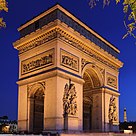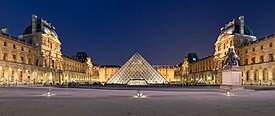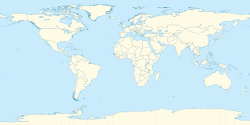
Back Paris ACE Париж ADY Parys Afrikaans Paris ALS ፓሪስ Amharic París AN Paris ANG पेरिस ANP باريس Arabic ܦܐܪܝܣ ARC
Paris | |
|---|---|
Commune and department | |
Clockwise from top: skyline of Paris on the Seine with the Eiffel Tower, Notre-Dame de Paris, the Louvre and its large pyramid, and the Arc de Triomphe | |
|
| |
| Motto(s): | |
| Coordinates: 48°51′24″N 2°21′03″E / 48.8567°N 2.3508°E | |
| Country | France |
| Region | Île-de-France |
| Department | Paris |
| Subdivisions | 20 arrondissements |
| Government | |
| • Mayor | Anne Hidalgo (PS) |
| Area | |
| • Commune and department | 105.4 km2 (40.7 sq mi) |
| Population (January 1, 2019 (est))[1] | |
| • Commune and department | 2,140,526 |
| • Density | 20,000/km2 (53,000/sq mi) |
| • Metro | 12,532,901 |
| Demonym | Parisian |
| Time zone | UTC+1 (CET) |
| • Summer (DST) | UTC+2 (CEST) |
| INSEE/postal code | 75001–75020, 75116 |
| Website | www.paris.fr |
Paris (nicknamed the "City of light") is the capital city of France, and the largest city in France. The area is 105 square kilometres (41 square miles), and around 2.15 million people live there. If suburbs are counted, the population of the Paris area rises to 10.7 million people. It is the most densely populated city in the European Union, with 20.653 people per square kilometer.
The Seine river runs through the oldest part of Paris, and divides it into two parts, known as the Left Bank and the Right Bank. It is surrounded by many forests.
Paris is also the center of French economy, politics, traffic and culture. Paris has many art museums and historical buildings. As a traffic center, Paris has a very good underground subway system (called the Metro). It also has two airports. The Metro was built in 1900, and its total length is more than 200 km (120 mi).
The city has a multi-cultural style, because 19% of the people there are from outside France.[3] There are many different restaurants with all kinds of food. Paris also has some types of pollution like air pollution and light pollution.
- ↑ "INSEE official estimated population by department and region as of 1 January 2019". 22 January 2019. Archived from the original on 21 April 2017. Retrieved 26 June 2019.
- ↑ "Dossier complet − Aire urbaine de Paris (001) | Insee". www.insee.fr. Archived from the original on 2018-07-24. Retrieved 2019-06-26.
- ↑ "Paris". www.worldcitiescultureforum.com. Retrieved 2021-06-07.








